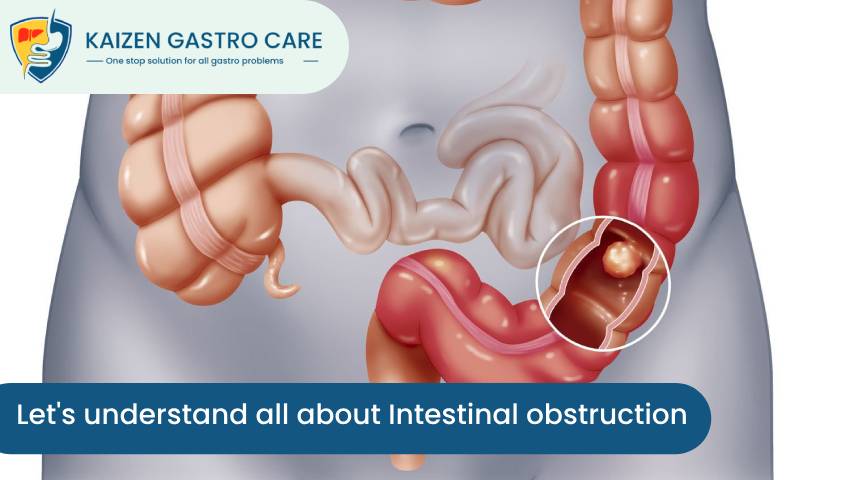
- 21/03/2024
- Kaizen Gastro Care
- 0 Comments
- Digestive Disorder
Let’s understand all about Intestinal obstruction
Intestinal obstruction is a serious medical condition that requires immediate attention and treatment. Understanding its causes, symptoms, and treatment options is crucial for effective management. In this blog, we delve into the complexities of intestinal obstruction, shedding light on its various factors with insights from Kaizen Gastro Care, a renowned gastroenterology clinic in Pune specializing in gastrointestinal disorders including intestinal obstruction.
At Kaizen Gastro Care, our multidisciplinary team of gastroenterologists, surgeons, and support staff is dedicated to providing personalized care and innovative treatments for intestinal obstruction. If you or a loved one are experiencing symptoms of intestinal obstruction, don’t hesitate to contact us for the best intestinal obstruction treatment in Pune, Maharashtra.
What is Intestinal Obstruction?
Intestinal obstruction happens when there is a blockage, preventing the normal movement of food, liquid, digestive juices, and gas through the intestines. This blockage can occur in either the small intestine or the large intestine and can be partial or complete, leading to significant health complications if not managed promptly.
Causes of Intestinal Obstruction:
There are several potential causes of intestinal obstruction, including:
- Adhesions: Scar tissue formation in the stomach, often a result of previous surgeries, can cause the intestines to become twisted or bent, leading to obstruction.
- Hernias: Inguinal or ventral hernias can trap a portion of the intestine, causing a blockage.
- Tumors: Both mild and malignant tumors can grow in the intestines, obstructing the passage of contents.
- Intussusception: This ensues when one segment of the intestine telescopes into another, leading to a blockage.
- Volvulus: Twisting of the intestine upon itself can result in obstruction.
- Foreign Bodies: Ingestion of foreign objects can obstruct the intestines, especially in children or people with certain behavioral or psychiatric disorders.
- Fecal Impaction: Severe constipation or a hardened stool mass can obstruct the passage of wastes through the intestines.
Symptoms of Intestinal Obstruction:
According to Dr. Samrat Jankar, the best Laparoscopic surgeon in Pune, symptoms of intestinal obstruction can vary depending on the severity and location of the blockage. Common symptoms include:
- Abdominal pain or cramping, often severe and irregular.
- Abdominal distention or bloating.
- Nausea and vomiting, sometimes with bile or fecal material.
- Constipation or inability to pass gas.
- Inability to tolerate food or fluids.
- Changes in bowel habits, such as diarrhea exchange with constipation.
- Feeling weak or dizzy
- Feeling unusually full after eating
If you experience any of these alongside the above symptoms, seek immediate medical attention:
- Bloody vomit
- Intense abdominal pain that gets steadily worse
- Fever
- Inability to keep any fluids down
If you or a loved one are experiencing symptoms of intestinal obstruction, don’t hesitate to reach out to our experienced team for expert evaluation and compassionate care.
Diagnosing Intestinal Obstruction:
Diagnosing intestinal obstruction typically involves a combination of medical history review, physical examination, and diagnostic tests such as:
- X-rays: To imagine the blockage and its location.
- CT scan: Provides detailed images of the intestines to determine the obstruction.
- Barium swallow or enema: Special imaging tests that can highlight the obstructed area.
- Blood tests: To check for symptoms of infection or electrolyte imbalances.
- Endoscopic methods to directly visualize the intestines and potentially relieve the obstruction.
Treatment for Intestinal Obstruction:
The treatment approach for intestinal obstruction relies on the underlying cause, severity of symptoms, and overall health of the patient. Dr. Samrat Jankar provides the best Intestinal Obstruction Treatment in Pune, including:
- Nonsurgical Management: In cases of partial obstruction or a dynamic ileus, conservative measures such as bowel rest, intravenous fluids, and nasogastric decompression may be sufficient.
- Surgical Intervention: Complete or complicated intestinal obstruction often needs surgical intervention to reduce the blockage, repair any underlying causes, and prevent complications such as bowel ischemia or perforation.
- Medications: Painkillers, antiemetics, and antibiotics may be prescribed to address symptoms and prevent complications.
- Supportive Care: Patients may require supportive care to manage symptoms, maintain hydration and nutrition, and prevent complications during recovery.
Preventing Intestinal Obstruction:
While not always preventable, certain lifestyle modifications can help lower your risk of intestinal obstruction:
- Eat a high-fiber diet
- Drink plenty of fluids
- Exercise regularly
- Avoid smoking
- Maintaining a healthy weight
Conclusion:
Intestinal obstruction is a serious condition that needs quick medical attention and expert care to prevent complications. By understanding the causes, symptoms, diagnosis, and treatment options for intestinal obstruction, you can make informed decisions about your healthcare and take proactive steps to address this condition effectively. At Kaizen Gastro Care, we are committed to providing comprehensive care and support to patients with intestinal obstruction, helping them achieve optimal health and quality of life.
